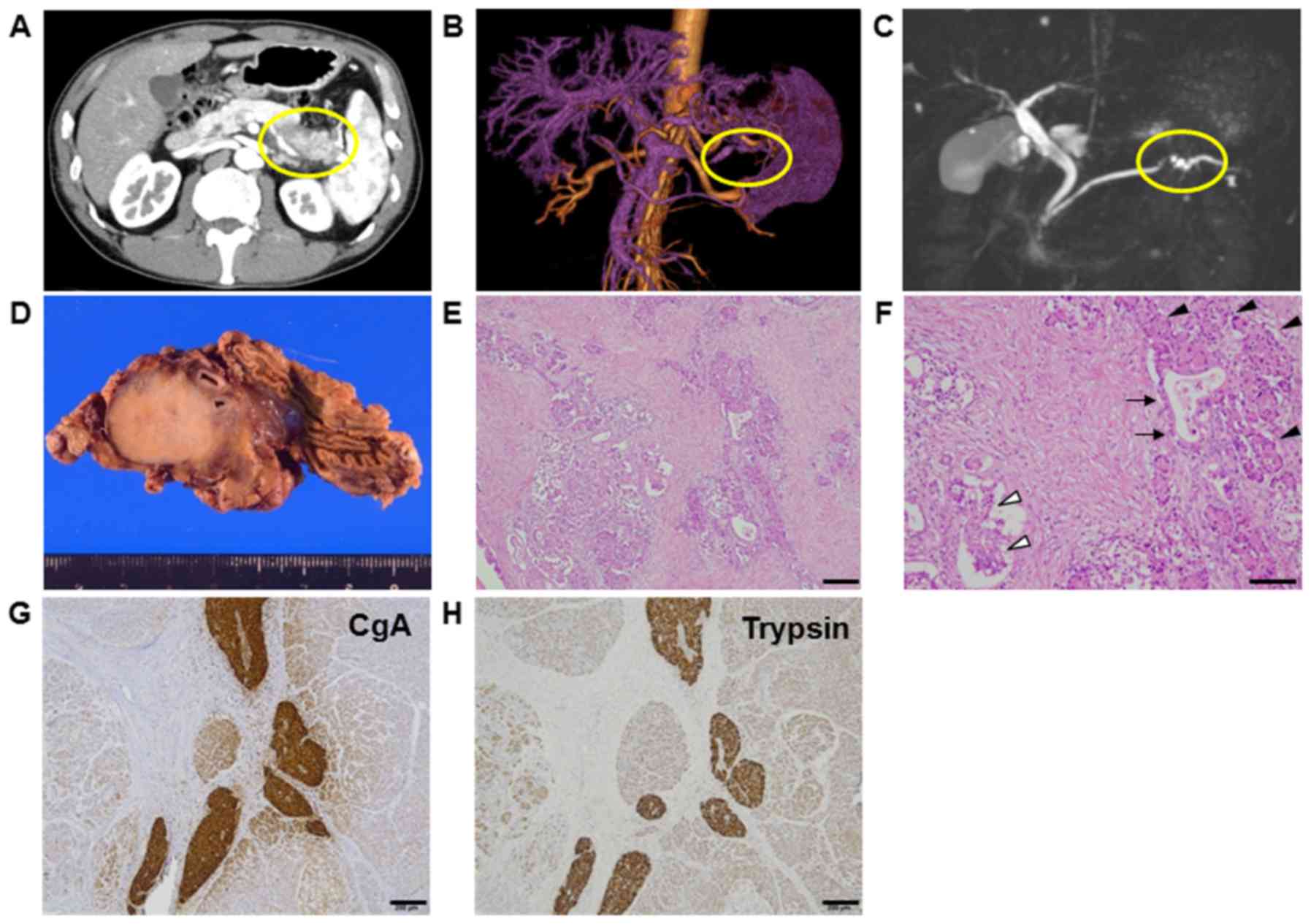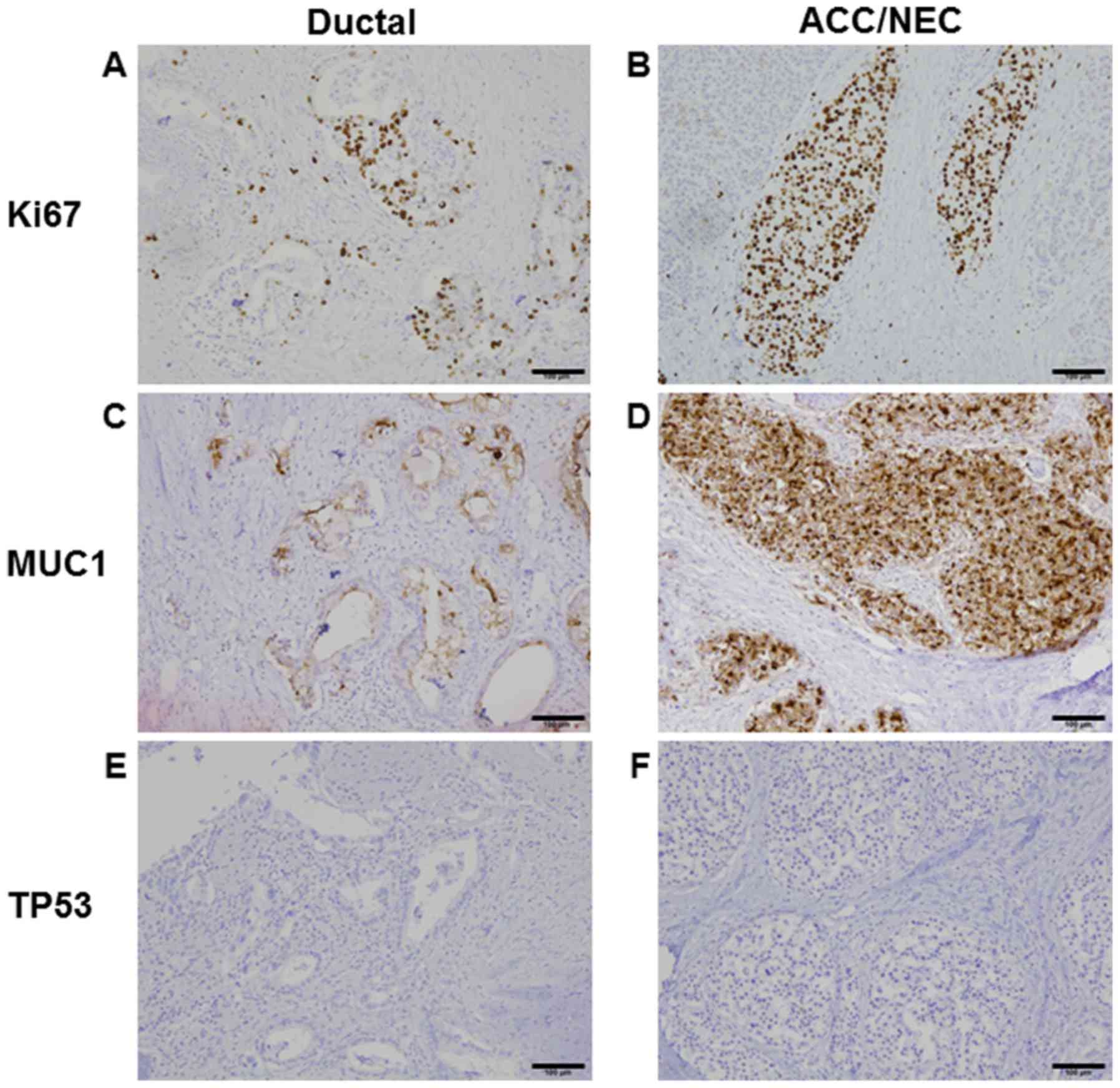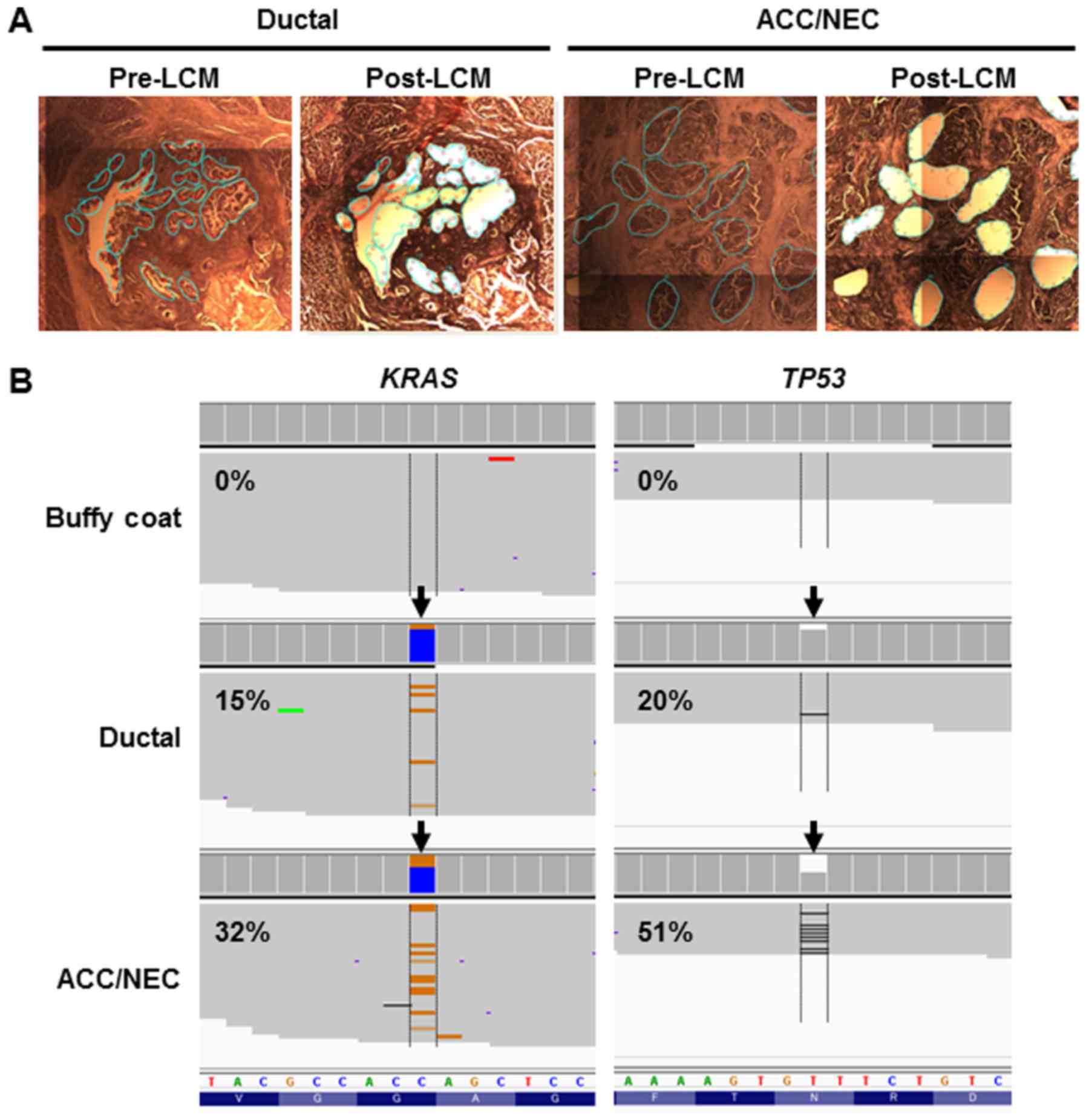|
1
|
Hori M, Matsuda T, Shibata A, Katanoda K,
Sobue T and Nishimoto H: Japan Cancer Surveillance Research Group:
Cancer incidence and incidence rates in Japan in 2009: A study of
32 population-based cancer registries for the Monitoring of Cancer
Incidence in Japan (MCIJ) project. Jpn J Clin Oncol. 45:884–891.
2015. View Article : Google Scholar : PubMed/NCBI
|
|
2
|
Longnecker DS: Pathologyof exocrine
pancreatic neoplasms. UpToDate. 2017 https://www.uptodate.com/contents/pathology-of-exocrine-pancreatic-neoplasmsAccessed.
Feb 06–2017.
|
|
3
|
Klimstra DS: Nonductal neoplasms of the
pancreas. Mod Pathol. 20 Suppl 1:S94–S112. 2007. View Article : Google Scholar : PubMed/NCBI
|
|
4
|
Fukushima N, Hruban RH, Kato Y, et al:
Ductal adenocarcinoma variants and mixed neoplasms of the
pancreasWHO classification of Tumors of the Digestive System.
Bosman FT, Camerio F, Hruban RH and Thiise ND: Lyon: IARC; 2010
|
|
5
|
Hirotsu Y, Nakagomi H, Sakamoto I, Amemiya
K, Mochizuki H and Omata M: Detection of BRCA1 and BRCA2 germline
mutations in Japanese population using next-generation sequencing.
Mol Genet Genomic Med. 3:121–129. 2015. View Article : Google Scholar : PubMed/NCBI
|
|
6
|
Hirotsu Y, Zheng TH, Amemiya K, Mochizuki
H, Guleng B and Omata M: Targeted and exome sequencing identified
somatic mutations in hepatocellular carcinoma. Hepatol Res.
5:1145–1151. 2016. View Article : Google Scholar
|
|
7
|
Furlan D, Cerutti R, Genasetti A, Pelosi
G, Uccella S, La Rosa S and Capella C: Microallelotyping defines
the monoclonal or the polyclonal origin of mixed and collision
endocrine-exocrine tumors of the gut. Lab Invest. 83:963–971. 2003.
View Article : Google Scholar : PubMed/NCBI
|
|
8
|
Scardoni M, Vittoria E, Volante M, Rusev
B, Bersani S, Mafficini A, Gottardi M, Giandomenico V, Malleo G,
Butturini G, et al: Mixed adenoneuroendocrine carcinomas of the
gastrointestinal tract: Targeted next-generation sequencing
suggests a monoclonal origin of the two components.
Neuroendocrinology. 100:310–316. 2014. View Article : Google Scholar : PubMed/NCBI
|
|
9
|
Waddell N, Pajic M, Patch AM, Chang DK,
Kassahn KS, Bailey P, Johns AL, Miller D, Nones K, Quek K, et al:
Whole genomes redefine the mutational landscape of pancreatic
cancer. Nature. 518:495–501. 2015. View Article : Google Scholar : PubMed/NCBI
|
|
10
|
Biankin AV, Waddell N, Kassahn KS, Gingras
MC, Muthuswamy LB, Johns AL, Miller DK, Wilson PJ, Patch AM, Wu J,
et al: Pancreatic cancer genomes reveal aberrations in axon
guidance pathway genes. Nature. 491:399–405. 2012. View Article : Google Scholar : PubMed/NCBI
|
|
11
|
La Rosa S, Bernasconi B, Frattini M,
Tibiletti MG, Molinari F, Furlan D, Sahnane N, Vanoli A, Albarello
L, Zhang L, et al: TP53 alterations in pancreatic acinar cell
carcinoma: New insights into the molecular pathology of this rare
cancer. Virchows Arch. 468:289–296. 2016. View Article : Google Scholar : PubMed/NCBI
|
|
12
|
Yachida S, Vakiani E, White CM, Zhong Y,
Saunders T, Morgan R, de Wilde RF, Maitra A, Hicks J, Demarzo AM,
et al: Small cell and large cell neuroendocrine carcinomas of the
pancreas are genetically similar and distinct from
well-differentiated pancreatic neuroendocrine tumors. Am J Surg
Pathol. 36:173–184. 2012. View Article : Google Scholar : PubMed/NCBI
|
|
13
|
Jiao Y, Yonescu R, Offerhaus GJ, Klimstra
DS, Maitra A, Eshleman JR, Herman JG, Poh W, Pelosof L, Wolfgang
CL, et al: Whole-exome sequencing of pancreatic neoplasms with
acinar differentiation. J Pathol. 232:428–435. 2014. View Article : Google Scholar : PubMed/NCBI
|
|
14
|
Chmielecki J, Hutchinson KE, Frampton GM,
Chalmers ZR, Johnson A, Shi C, Elvin J, Ali SM, Ross JS, Basturk O,
et al: Comprehensive genomic profiling of pancreatic acinar cell
carcinomas identifies recurrent RAF fusions and frequent
inactivation of DNA repair genes. Cancer Discov. 4:1398–1405. 2014.
View Article : Google Scholar : PubMed/NCBI
|
|
15
|
Tuveson DA and Neoptolemos JP:
Understanding metastasis in pancreatic cancer: A call for new
clinical approaches. Cell. 148:21–23. 2012. View Article : Google Scholar : PubMed/NCBI
|
|
16
|
Schmid RM: Acinar-to-ductal metaplasia in
pancreatic cancer development. J Clin Invest. 109:1403–1404. 2002.
View Article : Google Scholar : PubMed/NCBI
|
|
17
|
Eser S, Reiff N, Messer M, Seidler B,
Gottschalk K, Dobler M, Hieber M, Arbeiter A, Klein S, Kong B, et
al: Selective requirement of PI3K/PDK1 signaling for Kras
oncogene-driven pancreatic cell plasticity and cancer. Cancer Cell.
23:406–420. 2013. View Article : Google Scholar : PubMed/NCBI
|
|
18
|
Liou GY, Döppler H, DelGiorno KE, Zhang L,
Leitges M, Crawford HC, Murphy MP and Storz P: Mutant KRas-induced
mitochondrial oxidative stress in acinar cells upregulates EGFR
signaling to drive formation of pancreatic precancerous lesions.
Cell Rep. 14:2325–2336. 2016. View Article : Google Scholar : PubMed/NCBI
|
|
19
|
Shi C, Hong SM, Lim P, Kamiyama H, Khan M,
Anders RA, Goggins M, Hruban RH and Eshleman JR: KRAS2 mutations in
human pancreatic acinar-ductal metaplastic lesions are limited to
those with PanIN: Implications for the human pancreatic cancer cell
of origin. Mol Cancer Res. 7:230–236. 2009. View Article : Google Scholar : PubMed/NCBI
|
|
20
|
Longnecker DS, Shinozuka H and Dekker A:
Focal acinar cell dysplasia in human pancreas. Cancer. 45:534–540.
1980. View Article : Google Scholar : PubMed/NCBI
|

















